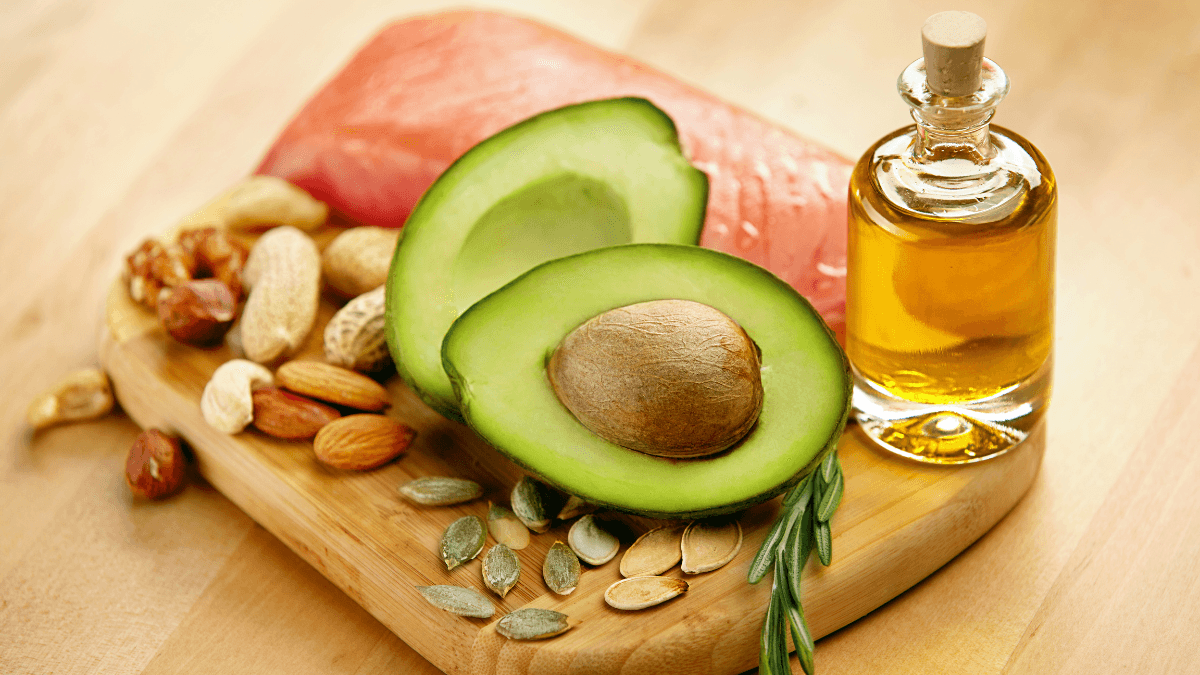Dreaming of becoming a mother is an incredibly beautiful and special journey for many women. While this journey may be different for everyone, paying attention to your nutritional needs and making conscious food choices can play a significant role in promoting fertility. Medical advancements have changed our understanding of nutrition and its impact on reproductive health. These are some of the best types of food for good fertility.
Can you increase your fertility with food?
If you and your partner are planning to start a family and are wondering how to improve your fertility, you might be surprised to learn that certain foods can play a big role in enhancing your chances of conceiving. Adding different types of food for good fertility can help optimize reproductive health and increase the likelihood of conception.
While food alone cannot guarantee conception, adopting a nourishing diet is an excellent way to support fertility and increase your chances of starting a family.

RELATED:| The best PCOS diet.
Can fast food have a negative affect on your fertility?
There is growing concern among researchers and health professionals regarding the impact of fast food consumption on fertility. Several studies have suggested that a diet high in fast food can have detrimental effects on reproductive health. The high levels of trans fats, refined carbohydrates, and processed ingredients commonly found in fast food have been linked to hormonal imbalances and reduced fertility in both men and women.
The frequent consumption of fast food has been associated with obesity and increased body mass index (BMI), both of which are known to contribute to infertility and pregnancy complications. Further research is needed to fully understand the mechanisms through which fast food affects fertility, but it is evident that maintaining a balanced and nutritious diet is crucial for optimal reproductive health.
What food should be avoided for improved fertility?
While there is no magical list of foods to completely avoid or consume to improve fertility, some evidence suggests that certain dietary choices may impact fertility. It is essential to remember that diet is only one aspect of overall fertility health. Maintaining a balanced diet, exercising regularly, managing stress, and consulting with a healthcare professional can contribute to optimizing fertility.
- Processed foods: Highly processed and refined foods often contain high amounts of unhealthy fats, added sugars, and artificial preservatives, which may negatively affect fertility. It is recommended to limit the consumption of processed snacks, fast food, sugary drinks, and pre-packaged meals.
- Trans fats: Trans fats, commonly found in partially hydrogenated oils and fried foods, have been associated with decreased fertility. It is best to avoid or minimize the consumption of fried foods, margarine, and partially hydrogenated oils.
- High mercury fish: Certain types of fish, shark, swordfish and macakrel, can contain high levels of mercury. High mercury consumption may impair fertility and harm early neurodevelopment if you become pregnant. Opt for low-mercury fish, such as salmon, trout, sardines, and anchovies.
- Excessive caffeine: While moderate caffeine consumption (200 mg or less per day) is considered safe, excessive caffeine has been associated with fertility issues and an increased risk of miscarriage. Limit your intake by avoiding excessive coffee, tea, energy drinks, and caffeinated sodas.
- Alcohol: Excessive alcohol consumption is linked to reduced fertility in both men and women. It is recommended to limit alcohol intake or avoid it altogether when trying to conceive.

RELATED:| What is PCOS and how can I manage it?
Ways to increase your fertility naturally.
- Maintain a healthy weight: Being underweight or overweight can disrupt hormonal balance, affecting fertility.
- Consume a balanced diet: Include foods rich in antioxidants, vitamins, minerals, and healthy fats to support reproductive health.
- Stay physically active: Regular exercise can improve fertility by promoting hormonal balance and blood flow to the reproductive organs.
- Reduce stress levels: High-stress levels can negatively impact fertility. Incorporate stress management techniques like yoga, meditation, or deep breathing exercises.
- Get enough sleep: Lack of sleep can disrupt hormonal balance, affecting fertility. Aim for 7-9 hours of quality sleep per night.
- Limit caffeine and alcohol intake: High caffeine and alcohol consumption have been linked to decreased fertility. Moderation is key.
- Avoid smoking and illegal drugs: Smoking and illicit drug use can significantly reduce fertility in both men and women.
- Stay hydrated: Drink enough water to support overall health, including reproductive health.
- Limit exposure to environmental toxins: Minimize exposure to harmful substances such as pesticides, chemicals, and heavy metals that can affect fertility.
- Engage in healthy sexual practices: Avoid the use of lubricants that can harm sperm quality and practice safe sex to prevent sexually transmitted infections that may affect fertility.
- Consider herbal supplements: Herbs like chasteberry, maca root, or evening primrose oil are believed to support fertility, but consult a healthcare professional before using them.
- Limit exposure to tight clothing and excessive heat: Avoid activities that increase scrotal temperature, such as hot tubs or wearing tight underwear, as it can affect sperm quality.
The best types of food for good fertility.
These are some of the best types of food for good fertility that you can add to your meals more often. Luckily, they are yummy and have so many other benefits for your health, so there’s no way to go wrong.
Whole Grains.
Starting our list with a staple, whole grains are an essential part of a fertility-friendly diet. Whole grains provide a high-fiber foundation, regulating blood sugar levels, and supporting hormonal balance. These grains are also rich in antioxidants, vitamins, and minerals, including vitamin B-complex and iron, crucial components for maintaining ovulatory health.
Whole grains you can try:
- Quinoa: High in protein and contains all nine essential amino acids.
- Brown rice: Rich in complex carbohydrates and B vitamins.
- Oats: Packed with fiber, iron, and zinc.
- Whole wheat: A good source of fiber, folate, and B vitamins.
- Barley: Contains selenium, which supports thyroid health, important for fertility.
- Millet: Gluten-free and rich in magnesium and phosphorus.
- Buckwheat: High in antioxidants and supports blood sugar balance.
- Amaranth: A nutrient-dense grain with iron, calcium, and magnesium.
- Spelt: Contains fiber, protein, and a range of vitamins and minerals.
- Rye: Supports hormonal balance with its high fiber content.

RELATED: The Best Fruits To Juice And Why They’re Healthy.
Leafy Greens.
Embracing a variety of leafy greens can be a game-changer when it comes to fertility. Packed with iron, calcium, and folate, these greens support healthy ovulation and aid DNA synthesis. Folate is particularly essential during the early stages of pregnancy when it helps in the development of the neural tube in the baby.
Leafy greens you can try:
- Spinach: High in folate, iron, and magnesium.
- Kale: Rich in vitamins A, C, and K, and calcium.
- Swiss chard: Packed with magnesium and antioxidants.
- Arugula: Contains folate and detoxifying compounds.
- Romaine lettuce: A good source of folate and vitamin C.
Healthy Fats.
Adding healthy fats enriches our diets with omega-3 fatty acids. These vital fats decrease inflammation, improve hormone production, and promote blood flow to the reproductive organs. Including omega-3 fatty acids as a part of our daily food intake may increase the chances of successful implantation and reduce the risk of miscarriages.
Healthy fats you can try:
- Avocados: Rich in monounsaturated fats, folate, and vitamin E.
- Nuts (e.g., almonds, walnuts): High in omega-3 fatty acids, vitamin E, and antioxidants.
- Seeds (e.g., flaxseeds, chia seeds, sunflower seeds): Contain omega-3s, zinc, and lignans for hormone balance.
- Olive oil: A great source of monounsaturated fats and antioxidants.
- Coconut oil: Provides medium-chain triglycerides (MCTs) that support energy production and hormone health.
- Fatty fish (e.g., salmon, mackerel, sardines): High in omega-3 fatty acids and vitamin D.
- Egg yolks: Rich in healthy fats, choline, and vitamin D.
- Dark chocolate (70% or higher): Contains healthy fats, magnesium, and antioxidants.
- Grass-fed butter or ghee: Provides vitamin K2 and essential fatty acids.
- Full-fat dairy (e.g., yogurt, cheese): Contains fat-soluble vitamins and supportive hormones.
RELATED: The Amazing Health Benefits Of Clove And Cinnamon Tea.
Fruits and Vegetables.
Colorful fruits and vegetables are not only visually appealing but also high in antioxidants, vitamins, and essential minerals. The antioxidants found in these foods counteract the oxidative stress caused by natural aging processes and environmental toxins, thus preserving the quality of eggs and sperm.
Fruits and veggies you can try:
- Berries (e.g., strawberries, blueberries, raspberries): Packed with antioxidants and vitamin C.
- Citrus fruits (e.g., oranges, lemons, grapefruits): Rich in vitamin C, folate, and potassium.
- Avocados: High in healthy fats, folate, and vitamin E.
- Pomegranates: Known for their antioxidants and fertility-boosting properties.
- Dark leafy greens (e.g., spinach, kale, Swiss chard): High in folate, iron, and calcium.
- Sweet potatoes: Loaded with beta-carotene and vitamin A.
- Broccoli: Rich in folate, vitamin C, and fiber.
- Carrots: Packed with beta-carotene for hormone balance.
5. Plant-Based Proteins.
Plant-based proteins are an excellent alternative to animal sources. These protein-rich foods are associated with a lower risk of infertility due to their low saturated fat content. By opting for plant-based protein sources, we can enhance our overall health and fertility.
Plant-based proteins you can try:
- Lentils: High in protein, iron, and folate, essential for reproductive health.
- Chickpeas: Rich in zinc, protein, and fiber.
- Black beans: Contain plant-based iron, magnesium, and folate.
- Quinoa: A complete protein with all nine essential amino acids.
- Tofu: A versatile source of protein and isoflavones, which support hormonal balance.
- Tempeh: Fermented soy product rich in protein and probiotics.
- Edamame: Young soybeans packed with protein, iron, and folate.
- Hemp seeds: Contain omega-3s, protein, and magnesium.
Conclusion.
While nutrition alone may not guarantee fertility, nourishing our bodies with a balanced and fertility-friendly diet is a practical step towards enhancing our reproductive health. Alongside maintaining a healthy lifestyle and consulting with medical professionals, embracing food for good fertility can boost our chances of conceiving and contribute to overall well-being.
Remember, each woman’s fertility journey is unique, but a holistic approach to health, including mindful food choices, can bring us closer to experiencing the joy of motherhood.
Healthy living,
Your Wellness Warrior!


